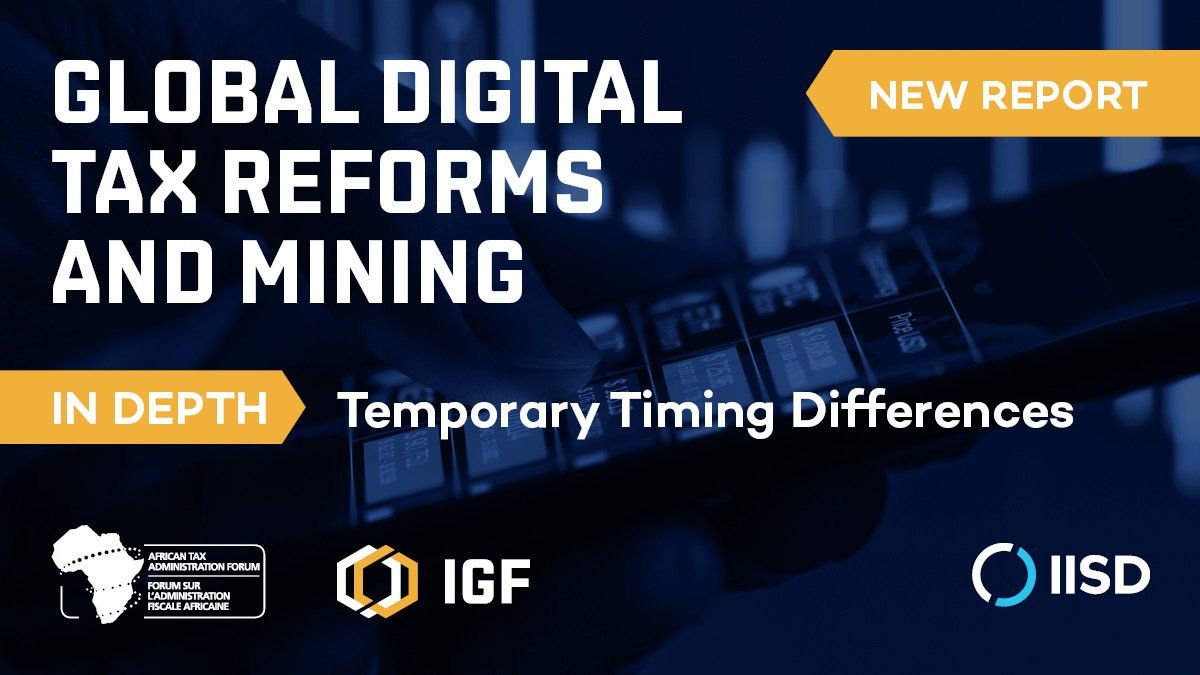Global Digital Tax Reforms And Mining: The Issue Of Temporary Timing Differences

In March 2021, the IGF issued a briefing note on the implications for the mining sector of the latest blueprints on global digital tax reforms published by the Organisation for Economic Co-operation and Development (OECD). The OECD released the blueprints on behalf of the Inclusive Framework on Base Erosion and Profit Shifting (BEPS),1 a group of over 130 nations negotiating new international tax rules to reduce tax avoidance by multinational companies. The IGF briefing raised some concerns regarding aspects of the blueprint of the second pillar of the reform proposal (Pillar Two) that may prove problematic for resource-rich countries. This briefing note digs deeper into the important issue of temporary timing differences arising under Pillar Two and the impact it may have on investment in the mining sector—particularly in resource-rich developing countries—and identifies possible policy solutions.
Overall, Pillar Two’s Global Anti-Base Erosion (GloBE) proposal supports more effective mining taxation in resource-rich developing countries by creating a minimum tax rate. The minimum tax rate is assessed against the Effective Tax Rate (ETR) of multinational companies in every country where they operate. It
should therefore disincentivize harmful tax competition and costly tax incentives such as income tax holidays. However, it does not adequately address temporary timing differences in the calculation of the ETR. These differences arise from the discrepancies between the accounting profits used to assess the GloBE ETR and taxable profits, which follow domestic tax rules. They are particularly important in the mining sector, where large capital expenditures are generally depreciated faster under local tax rules than under accounting norms.
Unresolved temporary timing differences could lead to lost investment and revenue from the mining sector in resource-rich countries, especially in the developing world. Under the GloBE proposal, any corporate income taxed below the minimum rate in a jurisdiction would be subject to a top-up tax in the country of the parent company. Therefore, tax incentives such as accelerated depreciation, designed to attract investment, would lose their effectiveness and could result in the transfer of billions of tax dollars from developing to developed countries.
There are three proposals to resolve temporary timing differences arising from the GloBE proposal. The first one consists of a combination of loss carryforwards and tax credits to compensate for any temporary differences over time. This would not work well for the mining sector, where tax losses are concentrated in the early stage of project development. The second is deferred-tax accounting, already used by corporations to resolve temporary timing differences between tax accounting and tax payments. It would create lower compliance costs but require rules to exclude uncertain tax positions and to guard against abuse of the system by companies or governments. The third one would use local tax rules to compute the GloBE ETR. It could solve temporary timing differences in a way that involves less judgment or estimation by industry than deferred-tax accounting but with more complexity and a higher compliance burden.
While this note is focused on temporary timing differences, it is important to state that many resource-rich developing countries have offered various tax incentives that may give rise to permanent timing differences under the GloBE rules. Tax holidays are the clearest example and precisely the type of incentive that Pillar Two is intended to target. However, it will take a long time for developing countries to fulfill the purpose of GloBE and adapt their legal framework and potentially review investment agreements to remove tax holidays and other incentives, giving rise to permanent timing differences—especially in the mining sector, where stabilization clauses in laws and contracts are prevalent. Developing countries will need the full support of the international community to adapt their legal frameworks in order to comply.
This note is structured as follows. Part 1 provides a brief refresher of Pillar Two— the OECD–G20 Inclusive Framework proposal for a global minimum ETR. Part 2 explains what timing differences are. Part 3 explains why timing differences matter for the mining sector and what impact they might have on resource-rich countries if left unresolved under Pillar Two. Part 4 describes some of the policy options being considered to address the concerns arising from timing differences. Part 5 briefly explores the issues arising from permanent timing differences, which will be elaborated on in a forthcoming dedicated briefing note. Part 6 concludes.
Read the full Report here .










